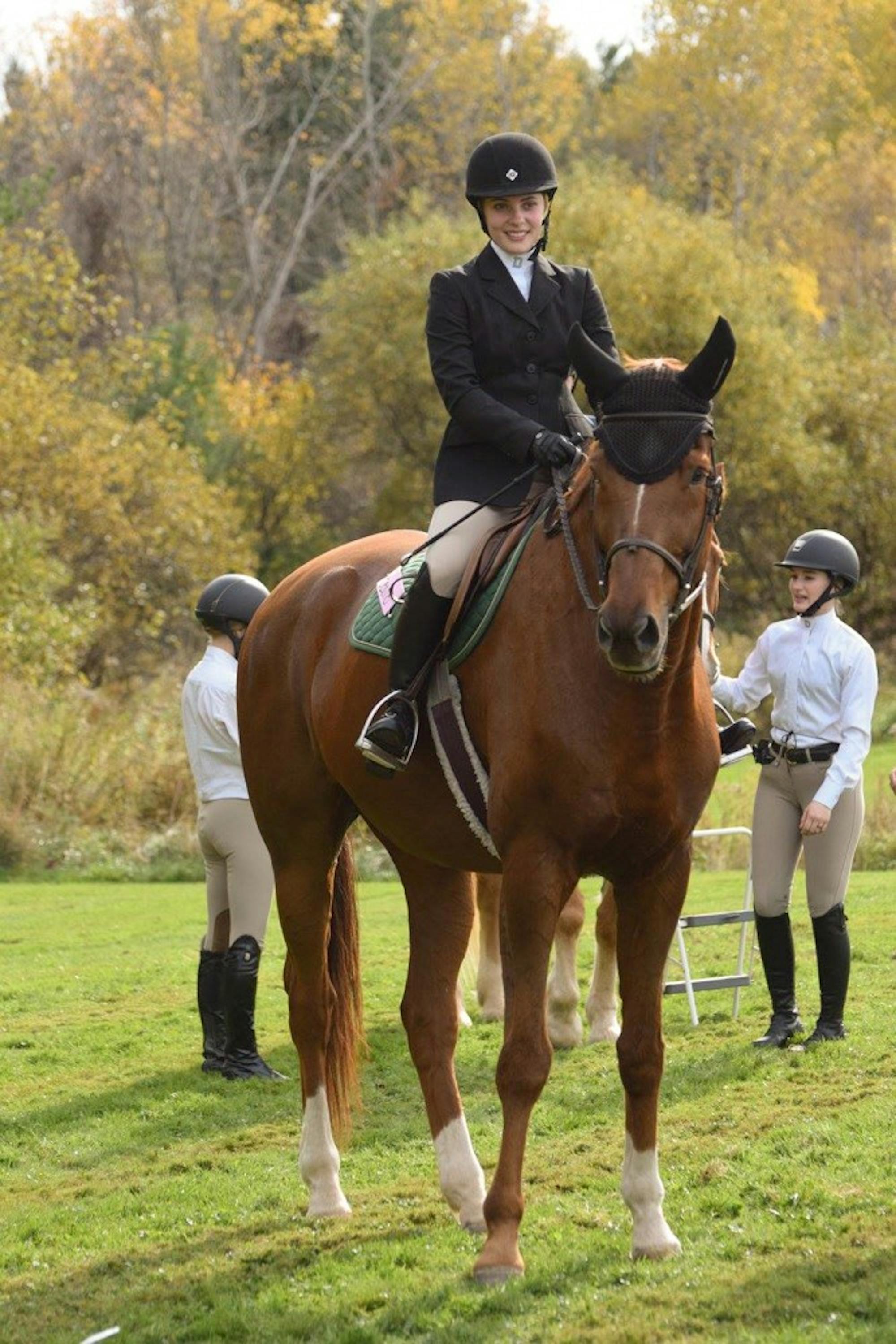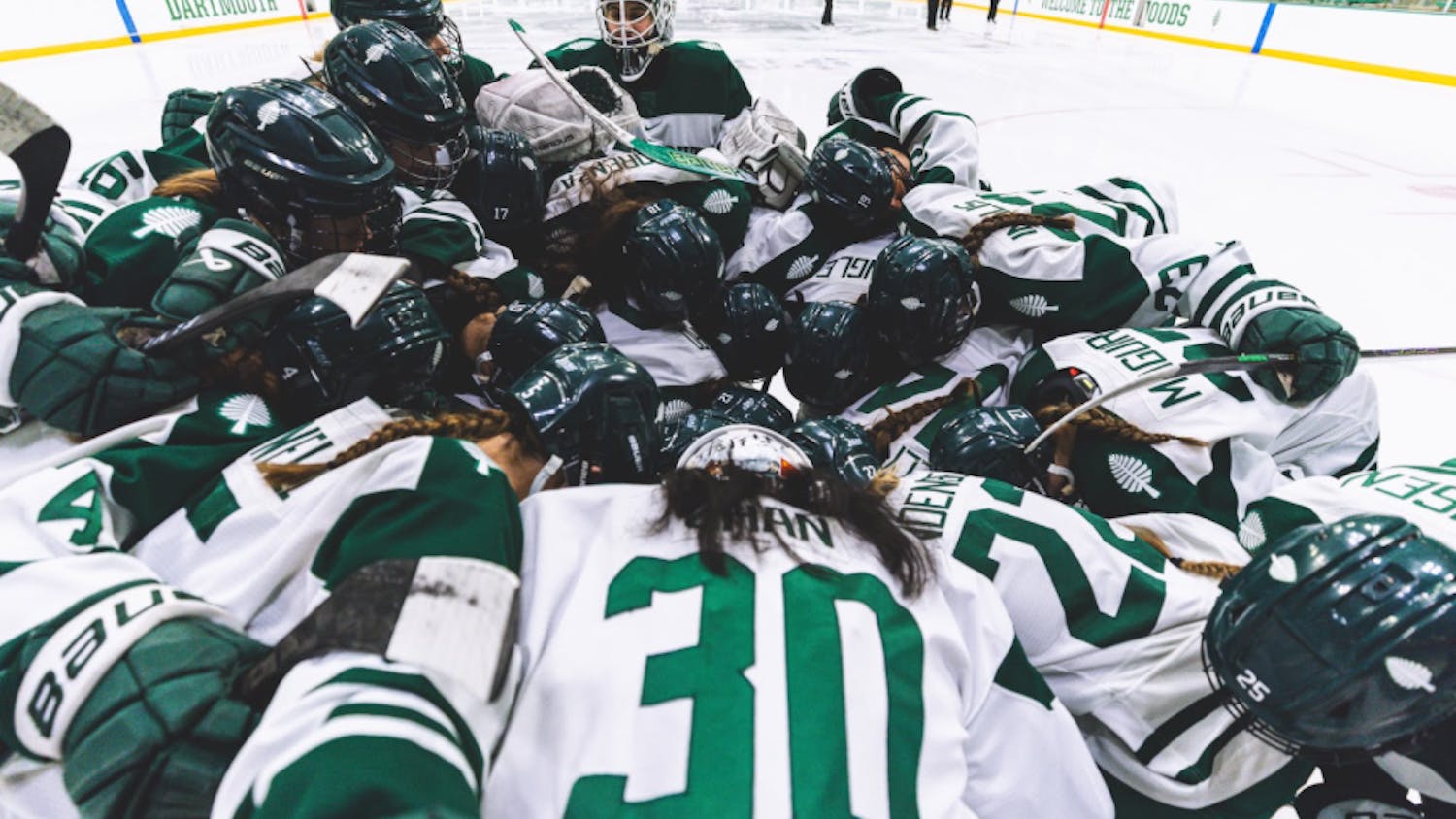Nathalie Ferneau ’18, an intermediate flat and novice fences rider, will be the sole representative for the Big Green at the 2018 Teresa L. McDonald IHSA Scholarship Challenge National Qualifiers, in which she previously competed in 2015. Ferneau will be joined at another Nationals event by teammate Olivia Champ ’19,who is entered in the Open Equitation Over Fences event.
How did you first get into equestrian competitions?
NF: I started off competing when I was only about six years old doing small shows for fun that were hosted by the barns that I took lessons at. These shows were purely for fun and I think that starting my show career at such low stakes events really helped me stay relaxed at bigger competitions in high school and later at Dartmouth. I started traveling to more serious competitions across New England and into New York once I got my own horse in middle school and kept competing at least a few times a year with my trainer Heidi Hauri Gill until I started college.
What has been your favorite moment from competition in your time at Dartmouth?
NF: We won the Ivies at home my sophomore year which was really wonderful. Winning a big title on our own horses with our friends and family watching makes it just that much better.
What made you want to come to Dartmouth?
NF: Growing up in Canaan, New Hampshire, I have always been aware of Dartmouth and I have known the equestrian coach Sally Batton for years. I wasn’t originally planning on coming to Dartmouth and was actually talking to Sally about tips for getting recruited to other schools’ teams. However, I took a Dartmouth class with Professor Julie Hruby in the classics department while still in high school and I loved it so much that I started seriously considering Dartmouth as an option. I also realized that Dartmouth had by far the best riding program of any of the other schools I was considering and that definitely ended up factoring into my choice to apply early decision.
You’ll be competing in the Teresa McDonald Scholarship Challenge at Nationals in May, which isn’t a conventional equestrian competition, but is instead a test on horsemanship. How has preparing for this been?
NF: I competed in this challenge my freshman year and my teammate Erin McCarthy-Keeler ’19 has also competed in it the past two years, so I have a pretty good idea of what to expect. However, the last time I went, a lot of the practical skills [I was] tested on such as wrapping the horse’s legs and taking the horse’s pulse were second nature because the horse I had in high school was constantly hurting himself and I was used to taking care of him. At Dartmouth I really don’t have to do things like this on a regular basis so I’ve been having to set aside time to practice. I was just practicing with Sally this morning and I’ll probably be at the farm most days until Nationals to make sure I’m not rusty.
How would you describe the chemistry of the team with everyone doing different events? Does this make a difference in terms of cohesiveness?
NF: Everyone on our team comes in with different backgrounds and experience levels which is somewhat exacerbated by the competition structure of different divisions. However, I think that our practice structure really helps combat the divisiveness because Sally plans our practices around our class schedule, not our competition level. This means that each practice of five people will probably have people of all grades and levels riding together. The small groups keep our team really close knit. We [also] lift as a full team twice a week and always travel to competition as a whole group and get a lot of meals together, so ultimately, I think we are a very close team despite the competition structure.
How does it feel to be a senior on the team? In what ways have things been different from your past seasons competing?
NF: This year I am not only a senior but we also have a very young team. I feel like this naturally made my focus turn away from my individual competition and more toward showing the new members the ropes. This has been my favorite year on the team because I feel like I learned that I am most effective as a team member behind the scenes rather than in the show ring. I love riding and showing, but I think I love helping my friends and teammates even more.
What has been the most challenging part or moment of your time on the equestrian team?
NF: The type of competition in college is judging the rider’s position and effectiveness on the horse. Before college, I rode in events that were either more objective because they were timed speed events or judged both the horse and the rider. At the beginning of college, I had a hard time dealing with the extremely subjective nature of the sport, along with the pressure of having all the attention on me. Nerves weren’t really a problem, but I did have to learn that sometimes the judge and your coach won’t see the same things and to not take judging decisions too personally.
How has it been balancing athletics and schoolwork, along with extracurriculars, over the last four years?
NF: I think because I was on the team almost from day one, I really don’t have anything else to compare it to. While practicing takes up a ton of my time, it ultimately makes me much more organized with my time and my grades are usually better when I’m in season than when I’m out. I do think that I missed out on other extracurricular activities because I am on the team, but I have never regretted it.
Do you think you’ll try to stay involved with horses and competition after your time at Dartmouth?
NF: I really hope that horses can always be a part of my life. However, owning a horse and especially competing is very expensive and time-consuming, so it probably won’t be in the cards until at least a few years after graduation. I’m very lucky in that I know I will always have the Morton Farm and the Dartmouth Riding Center to come home to if I ever need a horse fix.
This interview has been edited and condensed for clarity and length.




